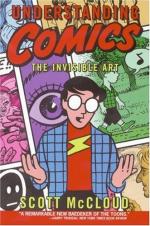
|
| Name: _________________________ | Period: ___________________ |
This test consists of 15 multiple choice questions and 5 short answer questions.
Multiple Choice Questions
1. Who first observed that people growing up in the late 20th century wanted roles more than goals?
(a) McLuhan
(b) Sergio Argonnes
(c) Dave McKean
(d) Stan Lee
2. What new law was created to protect Töpffer's new art form following the successful publication of "A Harlot's Progress" and its sequel?
(a) Copyright
(b) Income tax
(c) Restraining order
(d) Minimum wage
3. The author likens the representation of Egyptian hieroglyphics to which of the following?
(a) Comics
(b) Sounds
(c) Numbers
(d) Words
4. Which of the following icons has a fixed and absolute meaning?
(a) Saints
(b) Idols
(c) Non-pictorial
(d) Pictorial
5. Visual iconography is to vocabulary as closure is to _______________.
(a) grammar
(b) speech
(c) punctuation
(d) capitalization
6. Within a comic storyline, what is the amount of time that passes from one panel to the next?
(a) One second
(b) One day
(c) Varies
(d) One minute
7. In a panel with a lot of action, such as the one on page 95, each figure is arranged sequentially and the audience will read them left to right. This could be argued as fitting the definition of _______.
(a) panels
(b) comics
(c) cartoons
(d) gutters
8. What is typically the third most common type of transition in the most storytelling technique used in comics?
(a) Subject-to-subject
(b) Action-to-action
(c) Scene-to-scene
(d) Moment-to-moment
9. The art of comics is as _______ as it is ________.
(a) meaningless; abstract
(b) subtractive; additive
(c) divisive; multiplicative
(d) humorous; generous
10. Using the pictorial vocabulary pyramid, Mary Fleener's style is NOT typically comprised of ________.
(a) iconic content
(b) reality
(c) language
(d) non-iconic content
11. When does the author begin practicing to be a comics artist?
(a) During his first office job
(b) Since he could pick up a pencil
(c) In tenth grade
(d) After his dog dies
12. Using the pictorial vocabulary pyramid, Herges' style is typically comprised of __________________.
(a) meaning and icon
(b) reality and language
(c) icon and reality
(d) icon and language
13. What transition offers no logical relationship between panels?
(a) Non-sequitur
(b) Scene-to-scene
(c) Action-to-action
(d) Subject-to-subject
14. Who painted "The Treachery of Images?"
(a) Kurtzman
(b) Magritte
(c) Sergio Aragones
(d) Jack Kirby
15. Who was the woodcut artist known for his silent "Woodcut Novels" of fables?
(a) William Hogarth
(b) Lynd Ward
(c) Frans Masereel
(d) Max Ernst
Short Answer Questions
1. What symbol does the author use to demonstrate the universality of cartoon imagery?
2. What is not one of the vertices of the triangular pictorial vocabulary?
3. When and where did the author think comics originated?
4. Who created "A Harlot's Progress," published in 1731?
5. Closure in comics fosters an intimacy between ________________________.
|
This section contains 430 words (approx. 2 pages at 300 words per page) |

|




